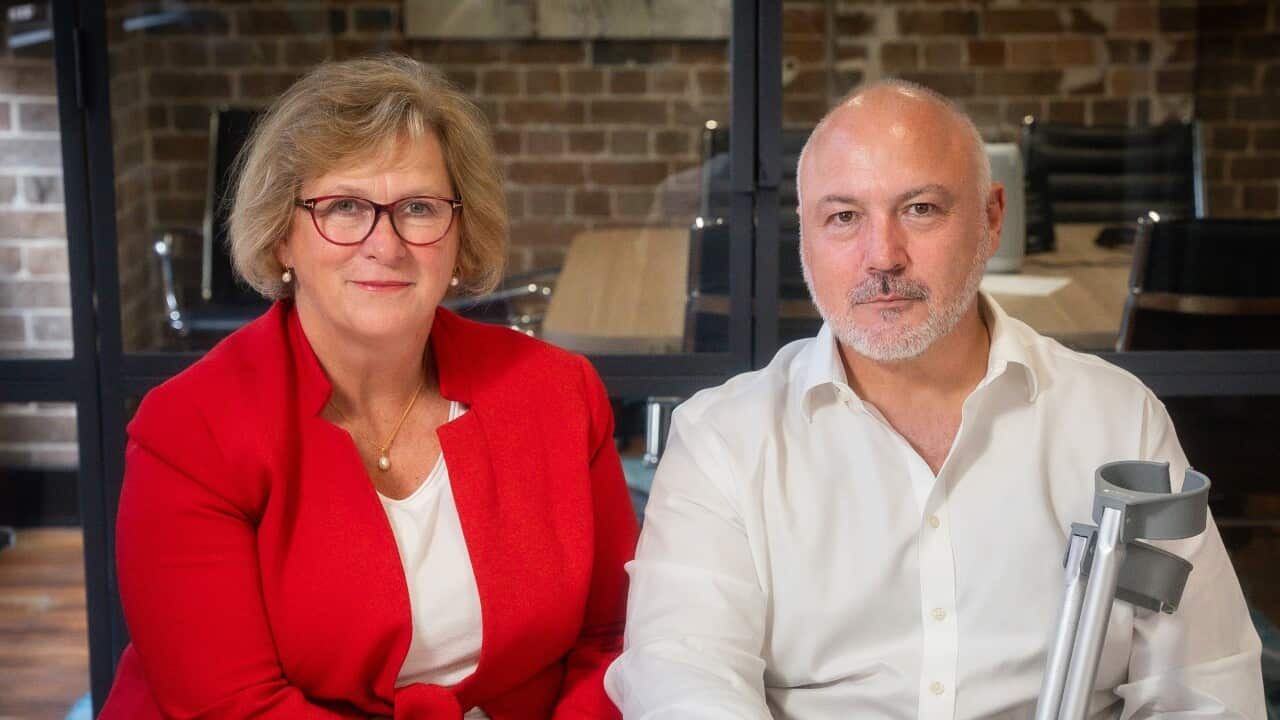TRANSCRIPT
Ross Chaplin works as an associate director at an independent tenant advisory company in central Sydney. He also lives with a disability.
“My job at Franklin Shanks is to look after not-for-profit and NDIS providers and look at their property function and create savings for them on their balance sheet so that they can have more money to put back into the facilities and services they provide.”
Mr Chaplin says decades of lived experience with a disability is a big part of his specialist success in the property field.
“I have a particular empathy with the not-for-profit organizations because I am what I refer to as a club member. This is my people, this is my community.”
The 52-year-old moves quickly around the city office using crutches or ‘sticks’ to support himself, due to limited strength in his legs following a viral infection as a child
“Guillain-Barré syndrome left me hemiplegic, which means that my left arm is about 50% strength. My right leg is about 2% strength. My left leg is about 20% strength, but my right arm is about 200% strength. I've just evolved for what I needed to do to get around on sticks.”
His early experiences growing up in Sydney’s north taught him a lot about the access barriers people with disability face.
“When I was at school in primary school and high school, I can emphatically guarantee that there was no allowances made - no ramps. There was slippery surface all around.”
Improving access to public spaces is his job and the willingness of his current employer to adapt the workplace for easier access has helped Mr Chaplin remain employed there.
“Small measures but with great impact for me. The door closer on the bathroom door has been taken off. Non-slip mats have been put down for me. I use my own car. I'm allowed to put a lot of expenses on a corporate card because they need me to be out there in front of people, which is where I'm most effective.”
Franklin Shanks CEO Mike Franklin says adapting the office is a small price to pay to retain a loyal and hard-working specialist.
“He's a great employee and one of the greatest things about Ross, he's very forward thinking. There's no doubt that his experience over the years has opened up the ability for us to advise more fully. Throughout the workplace, there's various legislation that covers disability access. Now down to simple things like how wide should a corridor be, how wide should doors would be, access in building with ramps and so forth. We advise a lot of clients on relocation strategies and that is something that needs to be taken into account whenever we look at buildings for them.”
Improving access is something Australian Disability Network CEO Corene Strauss is passionate about, to help people with disability pursue successful long-term careers.
“Australia has really improved a lot over the years around disability employment, but what we are seeing is that employers are doing a good job starting to employ people with disability and they think that that's the stopping point. They've done their job, but what they're not doing is actually recognizing and supporting their employees to progress their careers.”
More than two million people in Australia of working age have a disability, however only half are employed, according to the Australian Bureau of Statistics. Ms Strauss says very few reach board level, enter politics or hold other senior roles.
“The lack of representation of senior leaders at board level and in management is predominantly a fear factor and a lack of understanding of the capabilities of people with disability. It's the fear of cost, it's the fear of liability.”
However, Ms Strauss says improving diversity on boards would have wide ranging benefits for the whole community.
“If boards appoint a person with disability on their boards, they are then understanding the importance of accessibility and inclusion right from the top down. It means that they're understanding what's happening at customer level and what barriers are they putting in place with their employees?”
The Australian Disability Network, and the Australian Institute of Company Directors, offer a scholarship program designed to help leaders with disability gain board positions. So far, of 54 scholarships awarded and 37 completed, seven scholars have gained a board role.
“The scholarship that we've introduced is about upskilling leaders with disability to learn about governance principles. At the same time, we are taking directors and we are upskilling them by making them a mentor to a person with a disability. To learn how to engage with people with disability and to ask the right questions such as what adjustments do you need for this meeting? And we are hoping to see a translation of many more people with disability on boards in the next five years.”
Mr Chaplin is a successful scholarship graduate and is proud to be taking on more leadership roles this year.
“I sit on two access advisory committees. I sit on a property investment committee, which is a paid position with a not-for-profit and I'm going onto a board position in a not-for-profit in the Blue Mountains. Because I now associate with boards and very senior people within councils, I'm regarded. I'm sought out. I am encouraged. There is endless data to say that a diversified board is a far more effective board, and if there's a diversified board, then there's going to be a far greater impetus and importance placed upon having a diversified workplace. If you have an environment that is accessible to everybody, literally nobody has a disability!”













